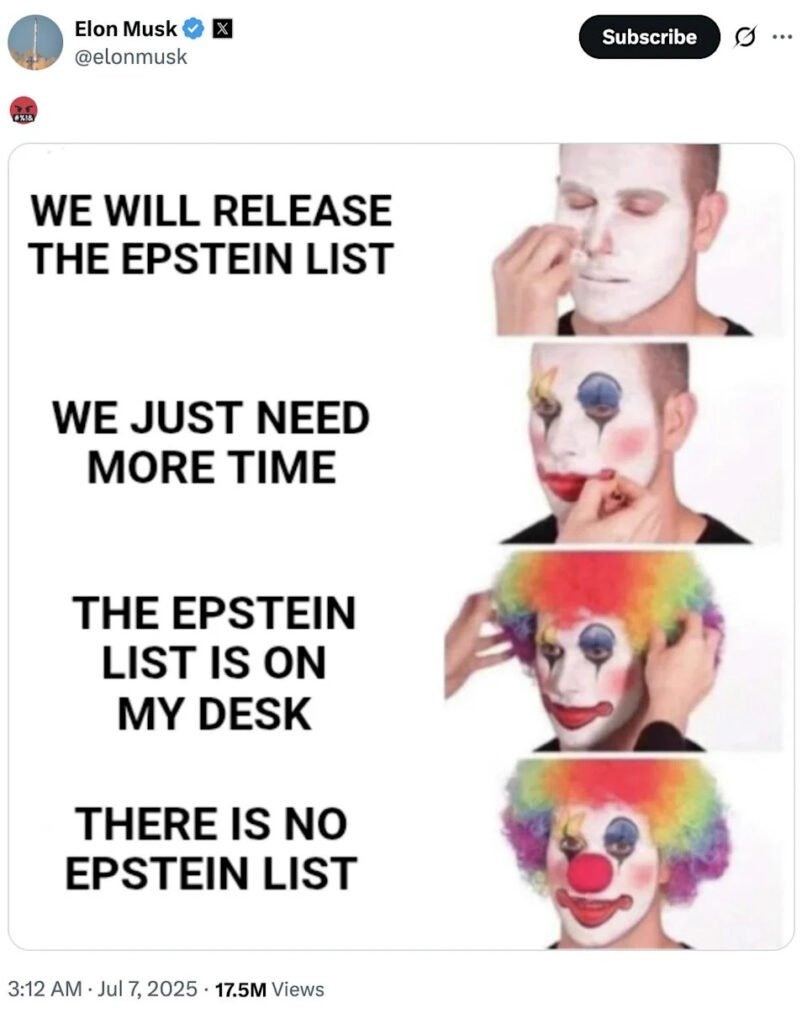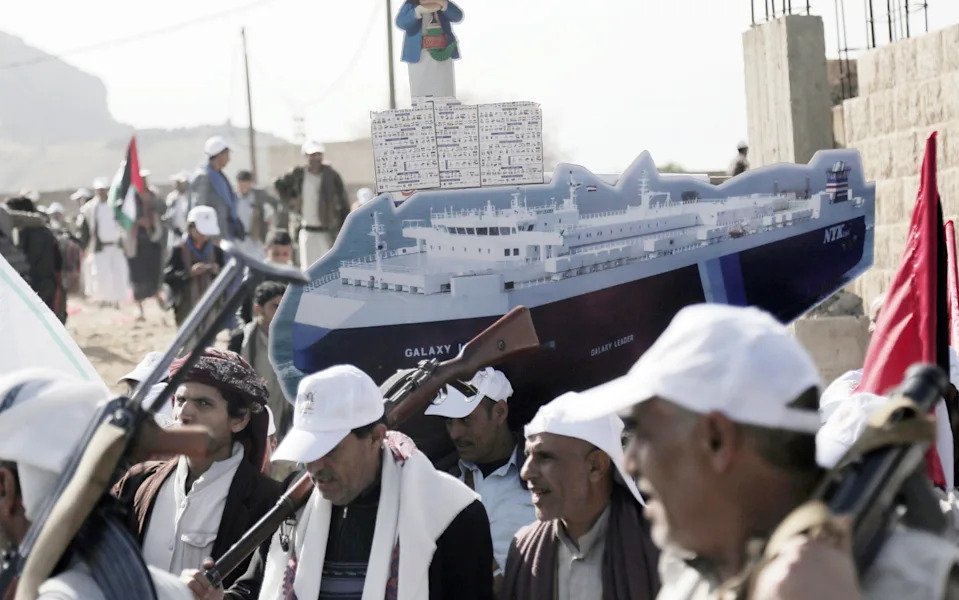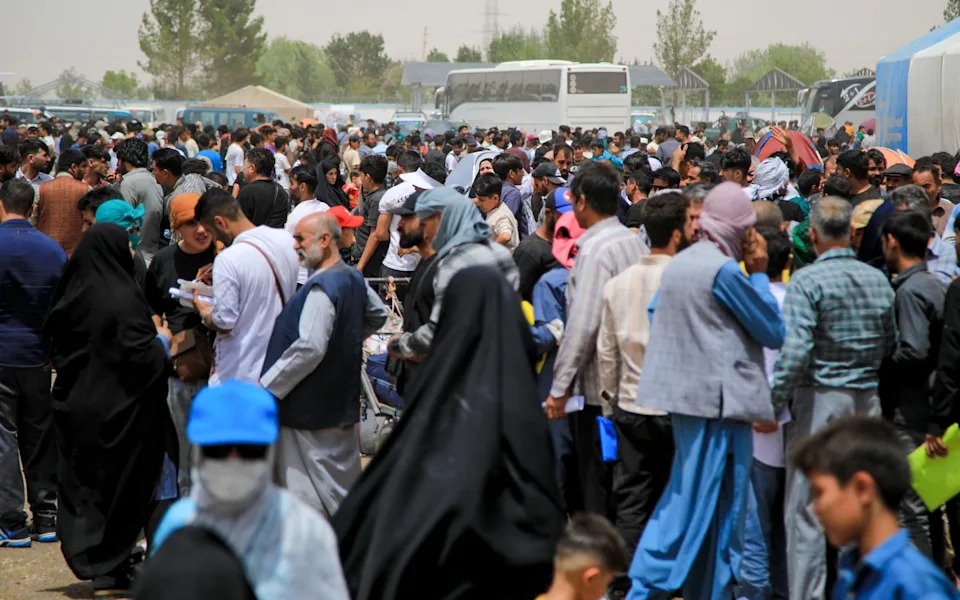
Andrew Roth
Benjamin Netanyahu returns to the White House holding all the cards in the Gaza talks in Washington. Joint attack on Iran have put the Israeli PM in a powerful position as he dangles the prospect of a Trump-brokered ceasefire deal.
Netanyahu and Donald Trump have a complex personal relationship – and Trump openly vented frustration at him last month during efforts to negotiate a truce with Iran – but the two have appeared in lockstep since the US launched a bombing run against Iran’s nuclear programme, fulfilling a key goal for Israeli war planners.
Netanyahu arrives in Washington in a strong political position, observers have said, potentially giving him the diplomatic cover he would need to end the war in Gaza without facing a revolt from his rightwing supporters that could lead to the collapse of his government.
Read our full analysis here:
Key events
Nearly 450,000 Afghans have returned from Iran since the start of June, the United Nations’ migration agency said on Monday, after Tehran ordered those without documentation to leave by July 6.
In late May, Iran said undocumented Afghans must leave the country by July 6, potentially impacting four million people out of the around six million Afghans Tehran says live in the country.
Numbers of people crossing the border have surged since mid-June, with some days seeing around 40,000 people crossing at Islam Qala in western Herat province, UN agencies have said.
From June 1 to July 5, 449,218 Afghans returned from Iran, a spokesman for the International Organization for Migration told AFP on Monday, adding that the total for the year so far was 906,326.
Israel’s military launched airstrikes early Monday targeting ports and facilities held by Yemen’s Houthi rebels, with the rebels responding with missile fire targeting Israel.
The attacks came after an attack Sunday targeting a Liberian-flagged ship in the Red Sea that caught fire and took on water, later forcing its crew to abandon the vessel.
Suspicion for the attack on the Greek-owned bulk carrier Magic Seas immediately fell on the Houthis, particularly as a security firm said bomb-carrying drone boats appeared to hit the ship after it was targeted by small arms and rocket-propelled grenades. The rebels’ media reported on the attack but did not claim it. It can take them hours or even days before they acknowledge an assault.
A renewed Houthi campaign against shipping could again draw in US and Western forces to the area, particularly after President Donald Trump targeted the rebels in a major airstrike campaign.
The meeting between Donald Trump and Benjamin Netanyahu will take place in the evening US time. What have both leaders said about a possible ceasefire deal?
Before departing for Washington on Sunday, Netanyahu praised the cooperation with the US for bringing a “huge victory over our shared enemy.” He struck a positive note on a ceasefire for Gaza, saying he was working “to achieve the deal under discussion, on the terms we agreed to.”
Asked on Friday how confident he was a ceasefire deal would come together, Trump told reporters: “I’m very optimistic – but you know, look, it changes from day to day.”
On Sunday evening, he seemed to narrow his expectation, telling reporters that he thought an agreement related to the remaining hostages would be reached in the coming week. He also said one of the matters he expected to discuss with Netanyahu “is probably a permanent deal with Iran.”
A Russian foreign ministry statement said its minister Sergei Lavrov had issued a new denunciation of Israeli and US strikes on Iran last month, “including the bombing of nuclear energy infrastructure under safeguards of the International Atomic Energy Agency”.
It came during Lavrov’s talks in Rio de Janeiro with Abbas Araqchi, his Iranian counterpart, whom he met at the BRICS summit. Lavrov restated Moscow’s offer to help resolve disputes around Tehran’s nuclear programme, the Russian foreign ministry said.
In a joint statement from the opening of the BRICS summit in Rio de Janeiro, the leaders of the BRICS group of developing nations called attacks against Iran’s “civilian infrastructure and peaceful nuclear facilities” a “violation of international law”.
The group expressed “grave concern” for the Palestinian people over Israeli attacks on Gaza, and condemned what the joint statement called a “terrorist attack” in India-administered Kashmir.
The group voiced its support for Ethiopia and Iran to join the World Trade Organization, while calling to urgently restore its ability to resolve trade disputes.

Andrew Roth
Benjamin Netanyahu returns to the White House holding all the cards in the Gaza talks in Washington. Joint attack on Iran have put the Israeli PM in a powerful position as he dangles the prospect of a Trump-brokered ceasefire deal.
Netanyahu and Donald Trump have a complex personal relationship – and Trump openly vented frustration at him last month during efforts to negotiate a truce with Iran – but the two have appeared in lockstep since the US launched a bombing run against Iran’s nuclear programme, fulfilling a key goal for Israeli war planners.
Netanyahu arrives in Washington in a strong political position, observers have said, potentially giving him the diplomatic cover he would need to end the war in Gaza without facing a revolt from his rightwing supporters that could lead to the collapse of his government.
Read our full analysis here:
Welcome and summary
Hello and welcome to the Guardian’s continuing coverage of the crisis in the Middle East.
Donald Trump has said there is a good chance a Gaza hostage release and ceasefire deal could be reached with the Hamas this week, as he prepares to meet with Israeli prime minister Benjamin Netanyahu on Monday at the White House.
Trump told reporters before departing for Washington on Sunday that such a deal meant “quite a few hostages” could be released.
Here is what has happened so far:
-
Donald Trump will host Benjamin Netanyahu in Washington DC on Monday as the US president seeks again to broker a peace deal in Gaza and the Israeli prime minister takes a victory lap through the Oval Office after a joint military campaign against Iran and a series of successful strikes against Tehran and its proxies in the Middle East.
-
The first session of indirect Hamas-Israel ceasefire talks in Qatar ended inconclusively, two Palestinian sources familiar with the matter said early on Monday, adding that the Israeli delegation didn’t have a sufficient mandate to reach an agreement with Hamas. The talks resumed on Sunday, ahead of Israeli Prime Minister Benjamin Netanyahu’s third visit to the White House.
-
Israeli warplanes launched a wave of strikes in Gaza on Sunday, killing at least 38 Palestinians, according to hospital officials, as talks over a ceasefire in the devastated territory reached a critical point. Officials at Nasser hospital in the southern city of Khan Younis said 18 people were killed by strikes in al-Mawasi, a nearby coastal area that is crowded with tented encampments of those displaced by fighting elsewhere.
-
Israel has continued to launch waves of airstrikes in Gaza, hours after Hamas said it was ready to start talks “immediately” on a US-sponsored proposal for a 60-day ceasefire. The announcement by the militant Islamist organisation increased hopes that a deal may be done within days to pause the killing in Gaza and possibly end the near 21-month conflict.
-
Israel has attacked Houthi targets in three Yemeni ports and a power plant, the Israeli military said early on Monday, marking the first Israeli attack on Yemen in almost a month. The strikes on Hodeidah, Ras Isa and Salif ports, and Ras Qantib power plant were due to repeated Houthi attacks on Israel, the military added.







